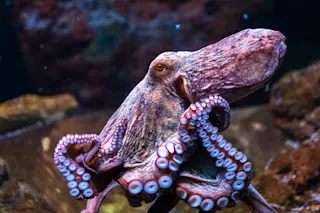(Credit: Olga Visavi/Shutterstock) Some cephalopod researchers have another job title: Octopus anesthesiologist. It sounds far-fetched, but it's an important task. Octopuses, and cephalopods in general, are the smartest invertebrates, and their complex, unique central nervous systems are studied by researchers interested in everything from motor control to visual processing to cognition itself. But that kind of research often involves invasive techniques that could cause the creatures significant pain.
As researchers began to grasp just how developed the brains of cephalopods were, they began to worry that they could actually feel something like what we would call pain. While most animals will flinch away from potentially harmful stimuli, experiencing what researchers call a "noxious stimuli," and what we simply call "ouch!", is another thing. Most invertebrates aren't thought actually feel pain, but cephalopods stand apart. Octopuses have as many neurons as a dog and are intelligent enough to open jars and ...














